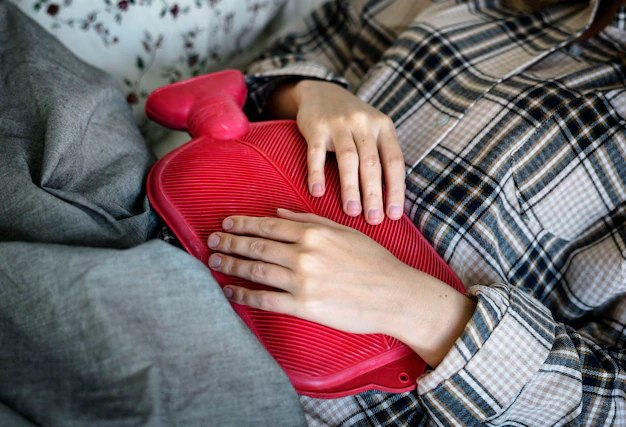Are painful periods signs of good fertility?



Periods can be a challenging experience for many women due to the physical and emotional symptoms that come with them. Painful periods, or dysmenorrhea, can be even more disruptive and uncomfortable. It is crucial to understand the causes of painful periods, the associated risk factors, the potential effect on fertility, and what examinations can be done to diagnose and treat them. In this article, we will look if painful periods affect your fertility and provide helpful tips for managing painful periods.

Painful periods, also known as dysmenorrhea, are a common problem experienced by many women during their menstrual cycle. Dysmenorrhea refers to cramping and other sensations of pain that occur in the lower abdomen before or during menstruation. Some women also experience nausea, vomiting, diarrhoea, headaches, and fatigue. Period pain can range from mild to severe and interfere with daily activities.
Uterine contractions cause painful periods or dysmenorrhea. During your menstrual cycle, your uterus contracts to help shed its lining. These contractions can cause pain, especially if they are strong or last for a long time. Several risk factors may increase the likelihood of experiencing period pain, including:
Family history of painful periods
An underlying medical condition
Obesity and Lack of physical activity
Smoking
High levels of stress
Consuming large amounts of alcohol or caffeine
It's important to note that having one or more of these risk factors does not necessarily mean that you will experience period pain. Additionally, there may be other factors that contribute to the development of dysmenorrhea.

Dysmenorrhea is the most common menstrual disorder and can cause cramping, bloating, and back pain. The pain can range from mild discomfort to unbearable severe pain. But is experiencing painful periods a sign of good fertility? The short answer is no. While period pain may be a common experience for many women, they do not necessarily indicate fertility or fertility problems. Two forms of dysmenorrhea exist: primary and secondary.
Primary dysmenorrhea- is the most common type, and contractions of the uterus cause it during menstruation. These contractions can cause pain and discomfort in the lower abdomen, back, and thighs. Primary dysmenorrhea is usually not a sign of any underlying health issues. It can be managed with over-the-counter pain medication and heat therapy.
Secondary dysmenorrhea- is caused by an underlying health condition, such as endometriosis, uterine fibroids, or pelvic inflammatory disease (PID). These conditions can cause inflammation and scarring, leading to more severe pain during menstruation.
If you have a pelvic inflammatory disease, you may also experience painful sexual intercourse and vaginal discharge. If you are experiencing secondary dysmenorrhea, you must consult your healthcare provider to determine the cause and receive proper treatment.
While period pains are not necessarily ominous signs of fertility, they may indicate an underlying condition that might adversely affect fertility. Several factors can affect a woman's ability to get pregnant.
One important factor is age. Female fertility begins to decline in the late 20s and early 30s, and it continues to decline as a woman ages. The chance of getting pregnant naturally drops significantly by age 40.
Some promising signs of fertility include:
Regular menstrual cycles,
Ovulation
Normal hormone levels,
A healthy sperm count in men
Lifestyle factors, such as maintaining a healthy weight and not smoking or consuming excessive alcohol, can also contribute to fertility.
It's important to note that these are general fertility indicators and that individual circumstances may vary. Speaking with a healthcare provider, specifically a fertility specialist, for personalized guidance on fertility and conception is always a good idea.
It's generally a good idea to speak with your doctor if your menstrual cramps are causing you significant discomfort or interfering with your daily activities. Talk to your doctor if:
Severe pain that does not improve with over-the-counter pain medication
Pain that begins suddenly and is much worse than usual
Pain persists for more than a few days
Pain that is accompanied by fever, vomiting, or diarrhoea
Pain that is so severe that you cannot perform your everyday activities
You experience painful intercourse
It's also a good idea to see a doctor if you have not yet started menstruating by age 16 or have irregular periods or no periods while not taking any contraception, including hormonal birth control. These could be signs of an underlying health condition that needs to be addressed.
Several tests may be done to help diagnose the cause of painful periods. These tests are based on your symptoms and are specific to the individual's medical history. These tests may include the following:
Pelvic exam: During a pelvic exam, the doctor will physically examine the reproductive organs and look for any abnormalities or signs of infection.
Pap smear: A pap smear test collects cells from the cervix to check for any abnormal changes indicative of cervical cancer.
Ultrasound: An ultrasound is a non-invasive test that helps to visualize the reproductive organs. It is helpful to look for any structural abnormalities, scar tissue or problems causing painful periods.
Hormonal testing: Hormonal imbalances can sometimes contribute to period pain. Blood tests can be done to measure the levels of certain hormones, such as oestrogen and progesterone, to determine if any imbalances are present. Order a Female Hormone Test from Welzo here.
STI testing: Sexually transmitted infections (STIs) can sometimes cause period pains. STI testing may be done to check for any diseases causing the pain.
There are various things you can try to manage painful period cramps:
Over-the-counter pain medication: Non-steroidal anti-inflammatory drugs (NSAIDs), such as ibuprofen and naproxen, can help alleviate pain and inflammation. Find our range here.
Heat therapy: Applying heat to your lower belly help relax the muscles that cause cramps. It can be done with a heating pad, a hot water bottle, or a warm bath or shower.
Exercise: Gentle exercise, such as walking or stretching, can help reduce cramps.
Relaxation techniques: Deep breathing, meditation, and other relaxation techniques can help reduce the pain of cramps.
Try a natural remedy: Some people find relief from cramps by using natural remedies such as ginger, turmeric, or essential oils. Avoiding caffeine and alcohol may also help.
In conclusion, period pain is not a sign of good fertility. While they are a common experience for many women, they do not necessarily indicate fertility or fertility problems. Several factors can affect a woman's fertility, including age, weight, lifestyle choices, and underlying health conditions. If you are trying to conceive, you must speak with your healthcare provider and address any potential fertility issues. Here are available tests for female fertility.
Learn more at Welzo! Read our articles When are you most fertile and How to test if a woman is infertile.
Plus get the inside scoop on our latest content and updates in our monthly newsletter.